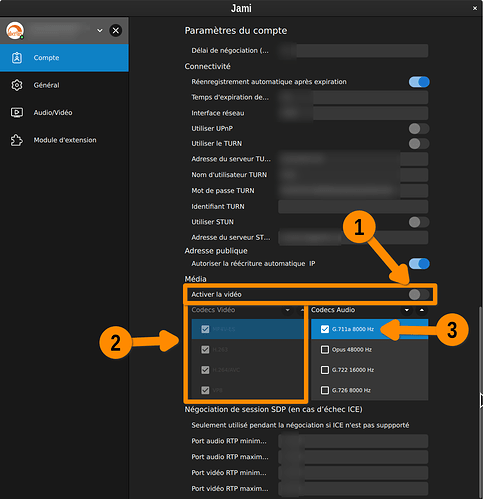okay that’s an advance sound is coming in NAT it’s something really complicate i would like to know all your scenario to try to help I remember you say something about both end’s are doing it whit Jami ? in that case I recommend try first whit one at the time till you get two ways audio
Thanks for helping me but there is a bug and it won’t work.
Do you have a NAT enabled router between your Jami client and the SIP server? If yes, is the router’s ALG enabled? - This is my current setting and it doesn’t work with it.
in fact i have remember something you need open the port 5060 and the rtp ports of your provider in you router to your Jami Device have you done that already? sure it’s that !
For those facing this challenge with SIP call without sound. If your Jami is behind a router, in addition to what @krishnak wrote above, if appropriate, you might need to either open or redirect port(s) in your router. The list of ports is at https://forum.jami.net/t/which-port-use-jami-application-are-there-risk-associated-on-upnp/835/2
Opening port(s) is a significant security risk, though. So before opening any port, I suggest to first activating only the appropriate audio codec(s). Then test. Details about this in my other comment at https://forum.jami.net/t/sip-call-without-sound/832/27?u=francewhoa
Dumb questions but what are actually the audio codecs supported by your SIP provider?
I agree with @sblin. To resolve the challenge of calls without sound, I suggest activating the appropriate audio codec(s).
To find which audio codec(s) is accepted by your SIP supplier, I suggest either contacting your supplier asking, or activating one audio codec at a time. Then test each codec. Until you narrow down which codec(s) your supplier is accepting.
Below is the same answer as above. But with details if you’re interested in those.
If you are not familiar with configuring audio codecs, with Jami Desktop version 202207262009, the steps are :
-
Using Jami, navigate to “Account / Compte” horizontal button —> “Advanced Account Settings” link —> “Audio codecs” group.
-
To find which audio codec(s) is supported by your SIP supplier, simply contact them asking. If somehow you are not able to contact your SIP supplier, I suggest selecting only ONE audio codec at a time. Then test it. If uncertain, start by selecting only ONE of the following popular audio codecs:
G.722 16000 HzG.711u 8000 HzG.711a 8000 Hz
The number 3 in this screenshot below shows that only one audio codec is selected for an SIP account.
-
Same steps with the video codecs. If uncertain if your SIP supplier accept video codec(s), simply deactivate all video codecs. The number 1 in the screenshot above shows that all video codecs are deactivated. Then test an audio call.
-
Try an audio call. If it is a success and with sound, then you know which one audio codec works. If the test fail, try the next audio codec. And so on. Until you narrow down to which one audio codec works.
Why one audio codec at a time? Because if you activate all audio codecs at once, usually, your device or softphone will likely try to connect with all codecs top-down. In turn, if any codec is not accepted by your SIP supplier, the SIP connection will automatically be ended by your supplier. In turn, you risk to not know which codec failed, and which codec(s) could be a success. So in the end, it’s much easier and faster to test one codec at a time. This is a one time test to narrow down per SIP supplier.
“There are two varieties of this Codec, namely U-law [G.711u 8000 Hz] and A-Law [G.711a 8000 Hz]. U-law is typically utilised within North America and Japan, whilst A-law is typically used by the rest of the world. G.711 will give the best call quality for VoIP on the basis that it uses no compression at all, and as a result, the call quality sounds like using a regular ISDN phone. This Codec is supported by most VoIP providers.”
Hello,
I have sometimes saw differents client’s errors, like:
- do not confuse RTP port and registration port ( most of time 5060 or 5061 )
- RTP audio port are not the same, depends if RTP is symmetric or asymetric
- Codecs ! are not the same on client/server
- voice activation detection activated , on Alcatel and sometime asterisk.
++
Marc
